16: Caring Communications
Risk Management and Treatment » Post-acute Care
16: Caring Communications
We suggest sending patients periodic caring communications (e.g., postal mail, text messages) in addition to usual care, for 12 months following hospitalization related to suicide risk to reduce the risk of suicide attempts.
Strength:
Weak for
Category:
ReviewedNew-replaced
Grades and Definitions
- Strong for
- or "We recommend offering this option …"
- Weak for
- or "We suggest offering this option …"
- No recommendation
- or "There is insufficient evidence …"
- Weak against
- or "We suggest not offering this option …"
- Strong against
- or "We recommend against offering this option …"
Categories and Definitions |
||
|---|---|---|
| Evidence Reviewed* | Recommendation Category* | Definition* |
| Reviewed | New-added | New recommendation following review of the evidence |
| New-replaced | Recommendation from previous CPG that has been carried over to the updated CPG that has been changed following review of the evidence | |
| Not changed | Recommendation from previous CPG that has been carried forward to the updated CPG where the evidence has been reviewed but the recommendation is not changed | |
| Amended | Recommendation from the previous CPG that has been carried forward to the updated CPG where the evidence has been reviewed and a minor amendment has been made | |
| Deleted | Recommendation from the previous CPG that has been removed based on review of the evidence | |
| Not reviewed | Not changed | Recommendation from previous CPG that has been carried forward to the updated CPG, but for which the evidence has not been reviewed |
| Amended | Recommendation from the previous CPG that has been carried forward to the updated CPG where the evidence has not been reviewed and a minor amendment has been made | |
| Deleted | Recommendation from the previous CPG that has been removed because it was deemed out of scope for the updated CPG | |
| *Adapted from the NICE guideline manual (2012): The guidelines manual. London: National Institute for Health and Care Excellence;2012. and Martinez Garcia L, McFarlane E, Barnes S, Sanabria AJ, Alonso-Coello P, Alderson P. Updated recommendations: An assessment of NICE clinical guidelines. Implement Sci. 2014;9:72. | ||
Recommendation Resources
Caring Communications is a suicide prevention approach that involves sending brief, non-demanding expressions of care and concern at specified intervals over a year or more to patients who have been suicidal (i.e., recipients).
- Caring Communications have been sent via different modalities (e.g., letters, cards, text messages).
- Caring Communications generally come from someone who has interacted with the recipient (i.e., author) or by someone or group who is expressing caring, but doesn’t (and perhaps won’t) meet the recipient (i.e., signatory).
- The most common schedule for sending Caring Communications is 1, 2, 3, 4, 6, 8, 10, and 12 months after discharge. However, recent versions send initial communications one day or one week after an initial meeting to assure intervention begins prior to repeat suicidal behavior.
- Depending on the modality — postal mail, text messages — reply rates differ from 0.1% (postal mail) to 19% (email) to 69% (text message).
- In the original studies, the author responded directly to replies from recipients either immediately or as part of the next letter. In recent versions with a signatory, responses may come from a designated person or someone from the group (e.g., crisis line staff).
Training and Clinical Resources
This section includes recommended examples, trainings and/or clinical resources about Caring Communications.
- What If It’s That Simple? Caring Communications for Suicide Prevention
- https://aims.uw.edu/aps/caringcontacts/#/
- Guiding Principles of Caring Communications (Jerome Motto, 1976)
-
- The forces that bind us willingly to life are mostly those exerted by our relationships with other people, whether they be intimately involved in our lives or influence us by other psychological processes.
- A suicidal person can be encouraged to retain an interest in continued living, by regular and long-term contact with another person who expresses caring and concern about the former’s well-being.
- The contact must be initiated by the concerned person and must put no demands or expectations on the other, in order to be experienced as an expression of unconditional concern and to have potential for reducing feelings of isolation and helplessness.
- Such a program of continuing contact can exert a long-term suicide prevention influence on high-risk persons who cannot accept the established health care system.
- Examples of Caring Communications
-
Click/Tap for smaller image
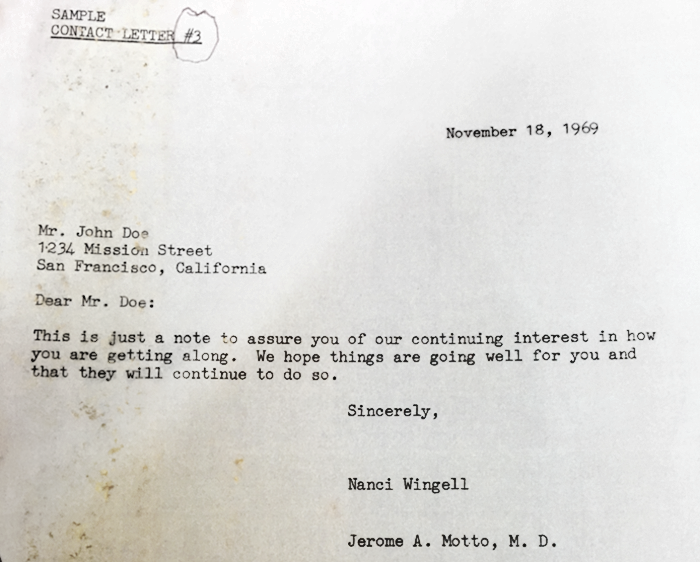
Example of Jerome Motto’s original Caring Letters (Courtesy of Jason Cherkis who was provided access to draft copies by Dr. Motto’s estate) -
[SAMPLE CONTACT LETTER #3]
November 18, 1969
Mr. John Doe
1234 Mission Street
San Francisco, CaliforniaDear Mr. Doe:
This is just a note to assure you of our continuing interest in how you are getting along. We hope things are going well for you and that they will continue to do so.
Sincerely,
Nanci Wingell
Jerome A. Motto, M.D. -
Click/Tap for smaller image
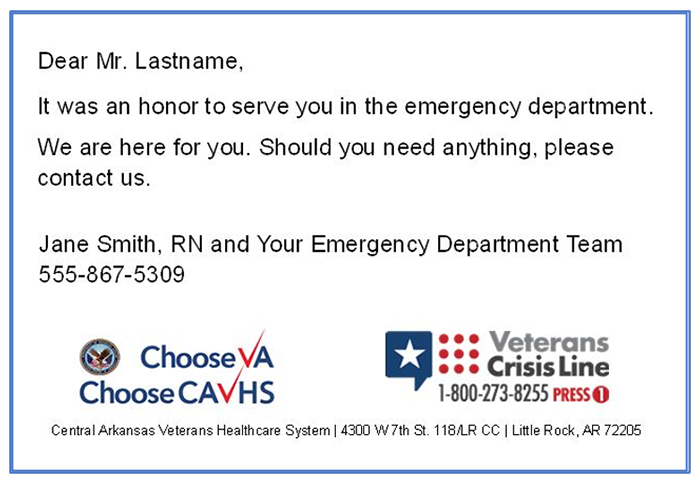
Example Caring Contact from the Emergency Department (Landes, Central Arkansas Veterans Healthcare System) -
Dear Mr. Lastname,
It was an honor to serve you in the emergency department.
We are here for you. Should you need anything, please contact us.
Jane Smith, RN and Your Emergency Department Team 555-867-5309
[Letterhead: Choose VA, Choose CAVHS, Veterans Crisis Line 1-800-273-8255 Press 1, Central Arkansas Veterans Healthcare System | 4300 W 7th St. 118/LR CC | Little Rock, AR 72205]
-
Click/Tap for smaller image

Example Caring Contact from Australia (Carter et al., 2005, BMJ) -
[Letterhead: Hunter Area Toxicology Service]
Dear FirstName
It has been a short time since you were here at Newcastle Mater Hospital, and we hope things are going well for you
If you wish to drop us a note we would be happy to hear from you.
Best wishes,
Dr Andrew Dawson
Dr Ian Whyte[Footer Address: Newcastle Mater Misericordiae Hospital, Bag 7, Hunter Regional Mail Centre NSW 2310, Phone: 49 211 283 Fax 49 211870]
-
Click/Tap for smaller image
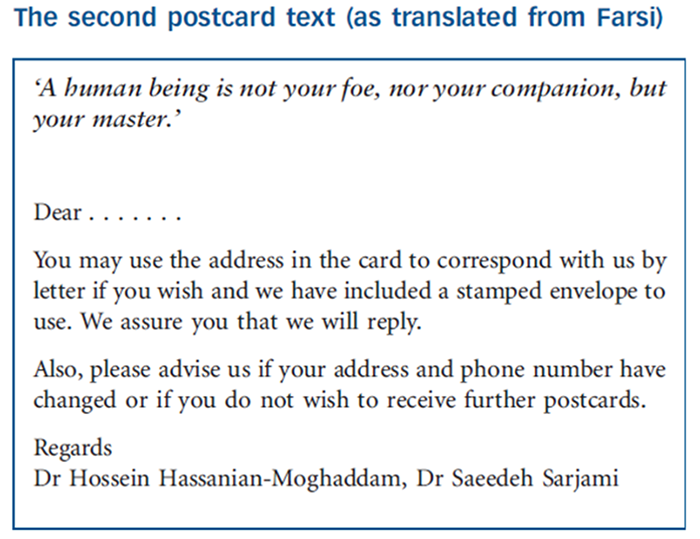
Example Caring Contact from Iran (on floral greeting cards) (Hassanian-Moghaddam et al., 2011, Br J Psychiatry Suppl) -
[The second postcard text (as translated from Farsi)]
"A human being is not your foe, nor your companion, but your master."
Dear......
You may use the address in the card to correspond with us by letter if you wish and we have included a stamped envelop to use. We assure you that we will reply.
Also, please advise us if your address and phone number have changed or if you do not wish to receive further postcards.
Regards Dr Hossein Hassanian-Moghaddam, Dr Saeedeh Sarjami
-
Click/Tap for smaller image
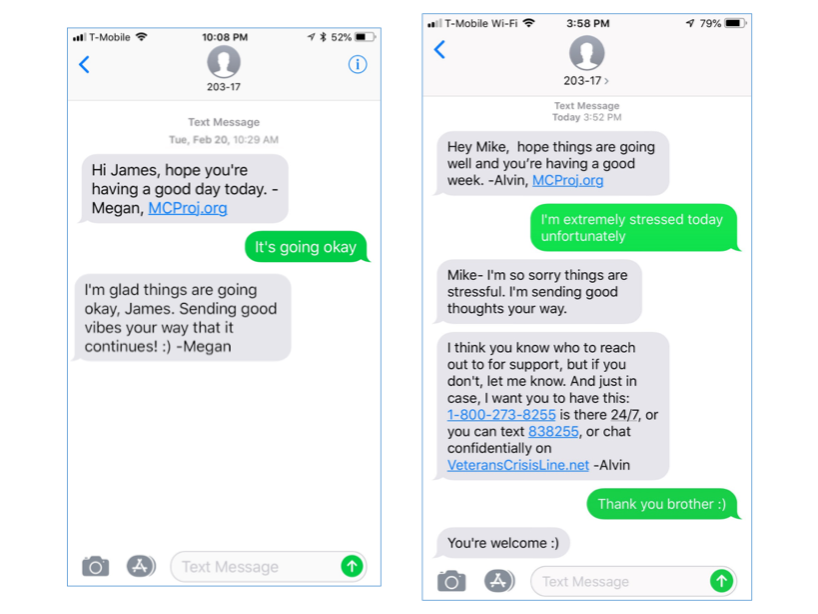
Example Caring Contact via Text Message (Comtois & Kerbrat) -
[Two side-by-side text message screens, each showing examples of a text message conversation]
[Screen 1]
Megan:
Hi James, hope you’re having a good day today. - Megan, MCProj.orgJames:
It’s going okayMegan:
I’m glad things are going okay, James. Sending good vibes your way that it continue! :) -Megan[Screen 2]
Alvin:
Hey Mike, hope things are going well and you’re having a good week. -Alvin, MCProj.orgMike:
I’m extremely stressed today unfortunatelyAlvin:
Mike- I’m so sorry things are stressful. I’m sending good thoughts your way.Alvin:
I think you know who to reach out for support, but if you don’t, let me know. And just in case, I want you have this: 1-800-273-8255 is there 24/7, or you can text 838255, or chat confidentially on VeteransCrisisLine.net - AlvinMike:
Thank you brother :)Alvin:
You’re welcome :) - Testimonials from People who Received Caring Messages
-
Click/Tap for smaller image
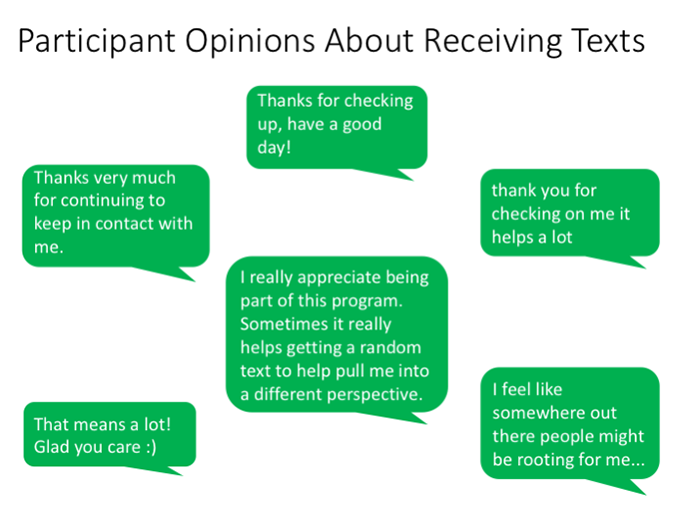
From Marines and Soldiers receiving Caring Communications via Text -
Participant Opinions About Receiving Texts:
Message 1: Thanks for checking up, have a good day!
Message 2: thank you for checking on me it helps a lot
Message 3: I feel like somewhere out there people might be rooting for me…
Message 4: I really appreciate being part of this program. Sometimes it really helps getting a random text to help pull me into a different perspective.
Message 5: That means a lot! Glad you care :)(smile emoji)
Message 6: Thanks very much for continuing to keep in contact with me.
-
Click/Tap for smaller image
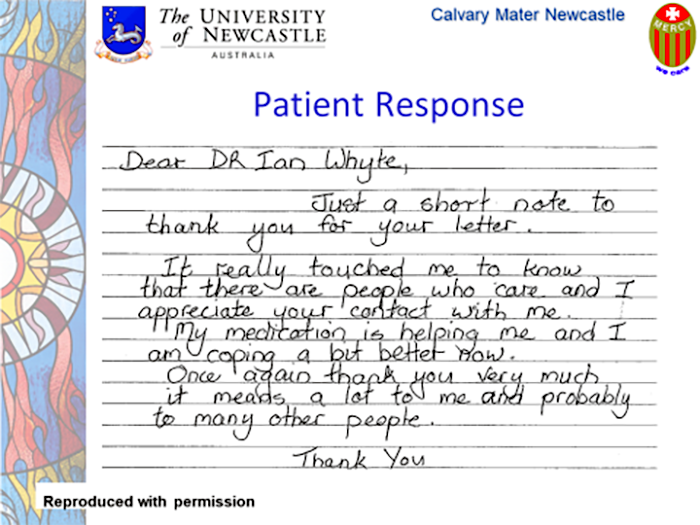
From recipient of Caring Communications in Australia -
[Letterhead: The University of Newcastle (Australia), Calvary Mater Newcastle]
Patient Response
Dear Dr Ian Whyte,
Just a short note to thank you for your letter.
It really touched me to know that there are people who care and I appreciate your contact with me.
My meditation is helping me and I am coping a bit better now.
Once again thank you very much it means a lot to me and probably to many other people.
Thank you
[Reproduced with permission]
Manuals
This section includes recommended manuals about Caring Communications.
- Caring Contacts tasks for authoring and sending messages
- Caring Contacts Mailing Guidance
- Caring Card Template
- Caring Card Mailings Spreadsheet
Videos
This section includes recommended video resources about Caring Communications.
- Brief Introduction to Caring Communications
- Could a Simple Intervention Fight a Suicide Crisis?
- How a ”caring contact” can prevent suicide
-
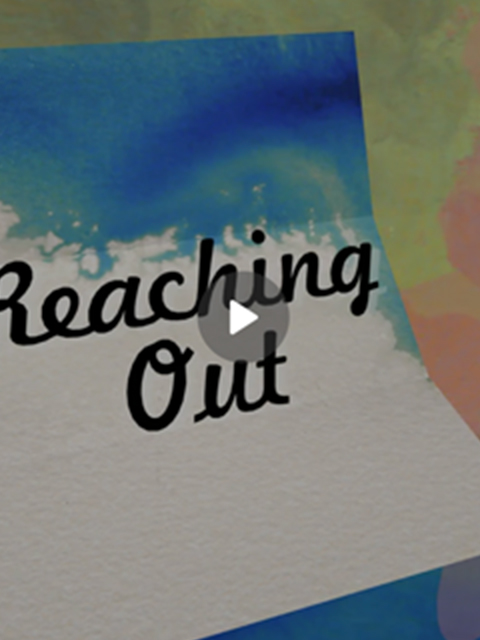 Reaching out: How caring letters help in suicide prevention Video segment from CBS Sunday Morning
Reaching out: How caring letters help in suicide prevention Video segment from CBS Sunday Morning - Other Videos
- Guiding Principles of Caring Contacts by its developer, Jerome Motto
Webinars
This section includes recommended webinars about Caring Communications.
-
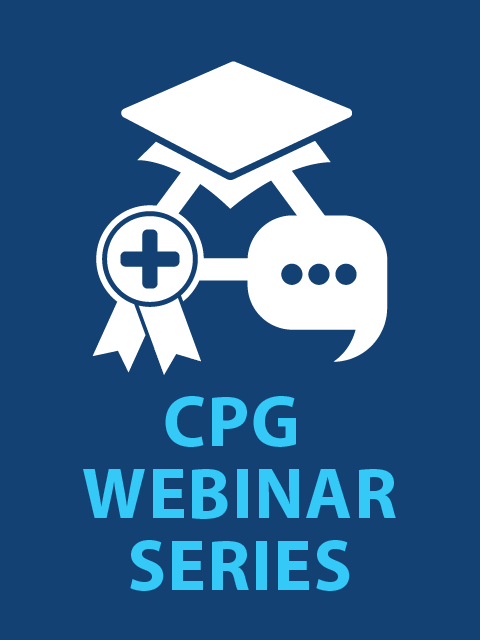 Latest Research Updates on Caring Contacts for Suicidal Patients This webinar provides information to help providers understand Caring Contacts, review the latest research concerning the intervention, and how to scale and implement Caring Contacts with Veterans.
Latest Research Updates on Caring Contacts for Suicidal Patients This webinar provides information to help providers understand Caring Contacts, review the latest research concerning the intervention, and how to scale and implement Caring Contacts with Veterans. -
 It IS That Simple: Nondemanding Caring Contacts for Suicide Prevention This webinar reviews Caring Contacts, policies and guidance within VHA that support providing this treatment.
It IS That Simple: Nondemanding Caring Contacts for Suicide Prevention This webinar reviews Caring Contacts, policies and guidance within VHA that support providing this treatment.
Visual Abstracts
This section includes visual abstracts related to Caring Communications.
- What are Veteran Preferences for the Caring Contacts Suicide Prevention Intervention?
-
Click/Tap for smaller image
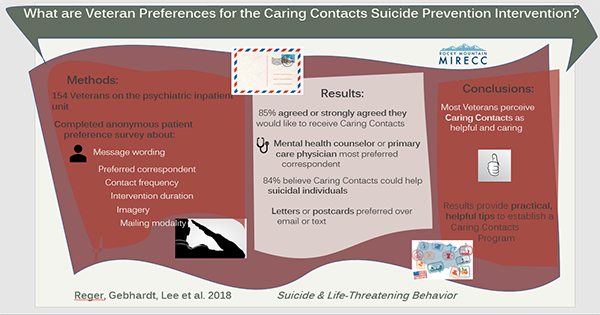
Related publication: Veteran Preferences for the Caring Contacts Suicide Prevention Intervention — PubMed (nih.gov) -
What are Veteran Preferences for the Caring Contacts Suicide Prevention Intervention?
Methods:
154 Veterans on the psychiatric inpatient unit
Completed anonymous patient preference survey about:
- Message wording
- Preferred correspondent
- Contact frequency
- Intervention duration
- Imagery
- Mailing modality
Results:
85% agreed or strongly agreed they would like to receive Caring Contacts
Mental health counselor or primary care physician most preferred correspondent
84% believe Caring Contacts could help suicidal individuals
Letters or postcards preferred over email or text
Conclusions:
Most Veterans perceive Caring Contacts as helpful and caring
Results provide practical, helpful tips to establish a Caring Contacts Program
Reger, Gebhardt, Lee et al. 2018. Suicide & Life-Threatening Behavior
- Do Caring Communications preferences differ based on patient characteristics?
-
Click/Tap for smaller image
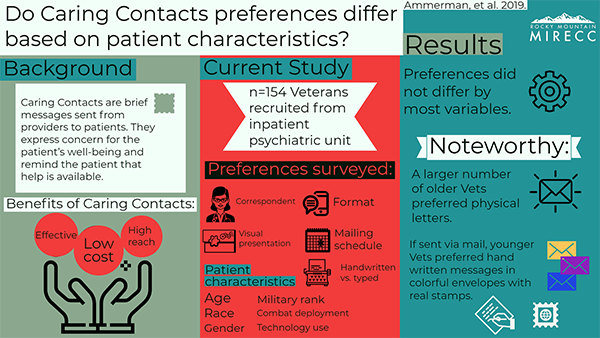
Related publication: Differential Preferences for the Caring Contacts Suicide Prevention Intervention Based on Patient Characteristics — PubMed (nih.gov) -
Do Caring Contacts preferences differ based on patient characteristics?
Background
Caring contacts are brief messages sent from providers to patients. They express concern for the patient’s well-being and remind the patient that help is available.
Benefits of Caring Contacts:
- Effective
- Low cost
- High reach
Current Study
n=154 Veterans recruited from inpatient psychiatric unit
Preferences surveyed:
- Correspondent
- Format
- Visual presentation
- Mailing schedule
- Handwritten vs. typed
Patient characteristics:
- Age
- Race
- Gender
- Military rank
- Combat deployment
- Technology use
Results
Preferences did not differ by most variables.
Noteworthy:
A large number of older Vets preferred physical letters.
If sent via mail, younger Vets preferred hand written message in colorful envelopes with real stamps
Ammerman, et al. 2019
Podcasts
This section includes recommended podcasts about Caring Communications.
- Rocky Mountain MIRECC Short Takes on Suicide Prevention
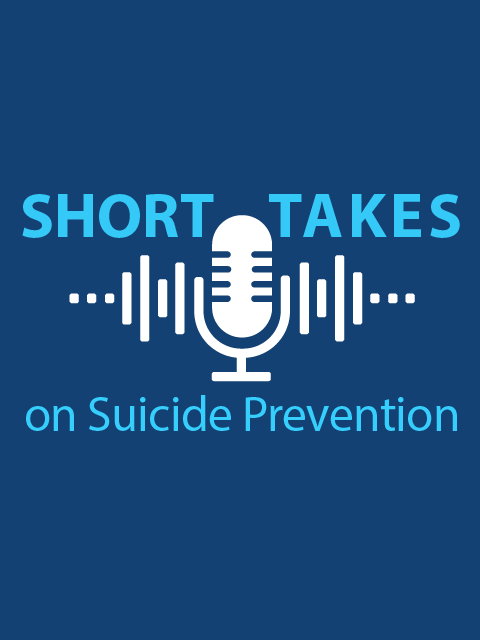 Dr. Kate Comtois on Caring Contacts — Simple and Meaningful
Dr. Kate Comtois on Caring Contacts — Simple and Meaningful
- JAMA Psychiatry Author Interviews
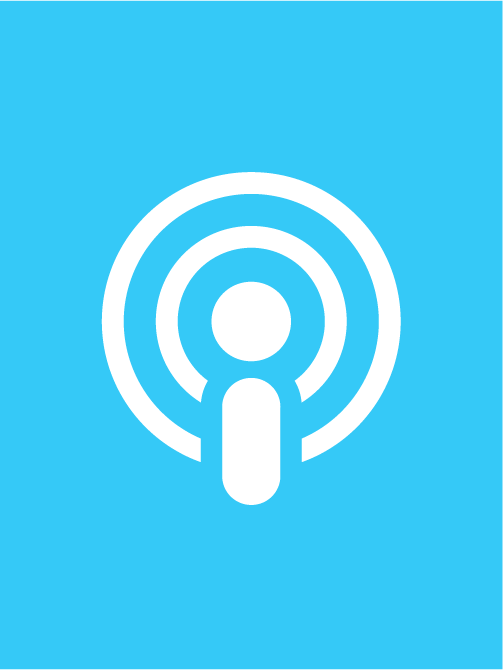 Effect of Augmenting Standard Care for Military Personnel With Brief Caring Text Messages for Suicide Prevention
Effect of Augmenting Standard Care for Military Personnel With Brief Caring Text Messages for Suicide Prevention
Articles
This section includes recommended articles about Caring Communications.
- (2019). Differential preferences for the caring contacts suicide prevention intervention based on patient characteristic. Archives of Suicide Research, 1-12. https://doi.org/10.1080/13811118.2019.1632231
- (2019). "Keep up the messages, sometimes it was a lifesaver": Effects of cultural adaptation on a suicide prevention clinical trial in American Indian/Alaska Native communities. Behaviour research and therapy, 166, 104333. https://doi.org/10.1016/j.brat.2023.104333
- . Effect of augmenting standard care for military personnel with brief caring text messages for suicide prevention: a randomized clinical trial. JAMA psychiatry 76.5 (2019): 474-483. https://doi.org/10.1001/jamapsychiatry.2018.4530
- . Designed and created for a veteran by a veteran: a pilot study of caring cards for suicide prevention. Suicide and Life-Threatening Behavior 51.5 (2019): 872-881. https://doi.org/10.3389/fpsyt.2021.746805
- (2017). Postcards in Persia: A Twelve to Twenty-four Month Follow-up of a Randomized Controlled Trial for Hospital-Treated Deliberate Self-Poisoning. Archives of suicide research : official journal of the International Academy for Suicide Research, 21(1). 138–154. https://doi.org/10.1080/13811118.2015.1004473
- (2023). Qualitative evaluation of a caring letters suicide prevention intervention for the Veterans Crisis Line. Psychiatric Services, Advance online publication. https://doi.org/10.1176/appi.ps.20220632
- (2021). Adapting Caring Contacts for Veterans in a Department of Veterans Affairs Emergency Department: Results From a Type 2 Hybrid Effectiveness-Implementation Pilot Study. Frontiers in psychiatry, 12, 746805. https://doi.org/10.3389/fpsyt.2021.746805
- (2023). Lessons Learned From Implementing a Caring Contacts Clinical Practice Guideline Recommendation. Psychiatric services (Washington, D.C.), appips20220629. Advance online publication. https://doi.org/10.1176/appi.ps.20220629
- (2023). Peer-Written Caring Letters for Veterans after a Suicidal Crisis. Archives of suicide research: official journal of the International Academy for Suicide Research, 1-15. Advance online publication. https://doi.org/10.1080/13811118.2023.2199799
- Caring Communications with Veterans
- Caring Contacts implementation toolkit (VA Intranet access required)
- Implementing Caring Contacts for Suicide Prevention in Non-Mental Health Settings
- QUERI Investigator Presents to VA House Subcommittee on Technology Modernization
- VA launches program to send caring letters to 90,000 Veterans
- Caring Communications with service members
- Caring Contacts: A simple, scalable intervention to reduce suicidal ideation and attempts
- It doesn’t take much for soldiers to feel cared for




















